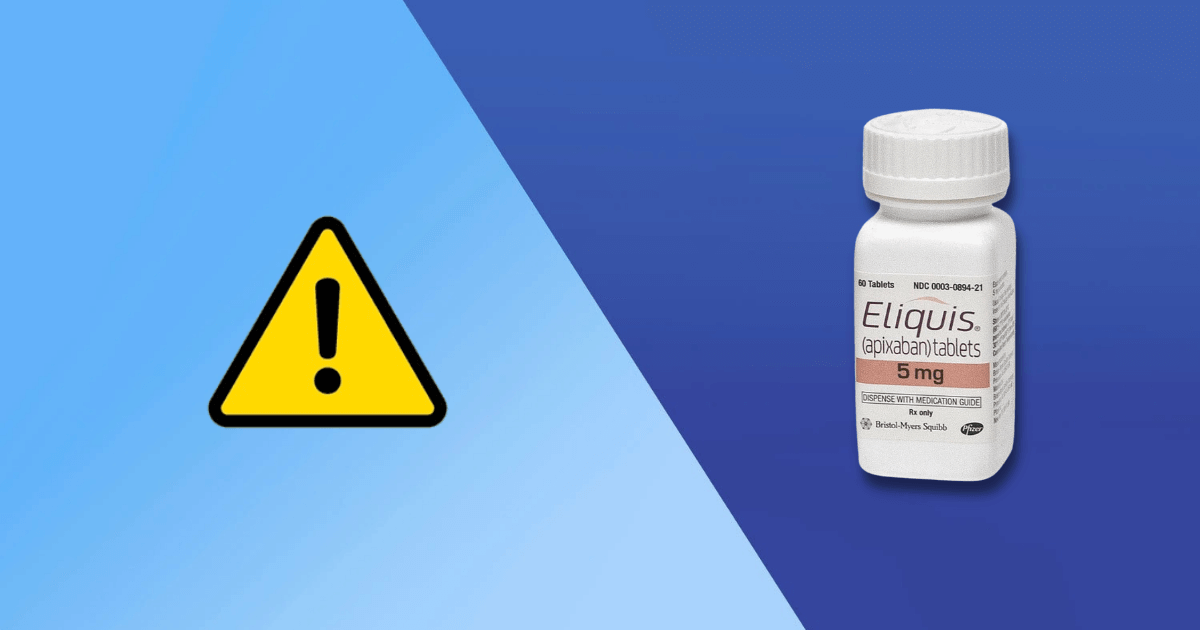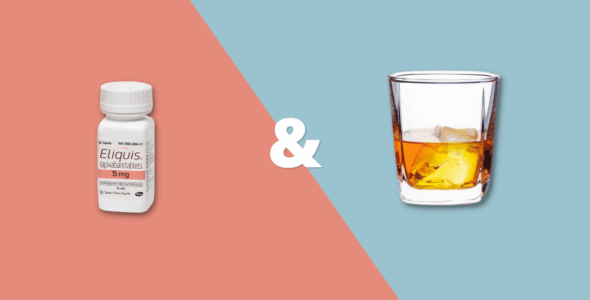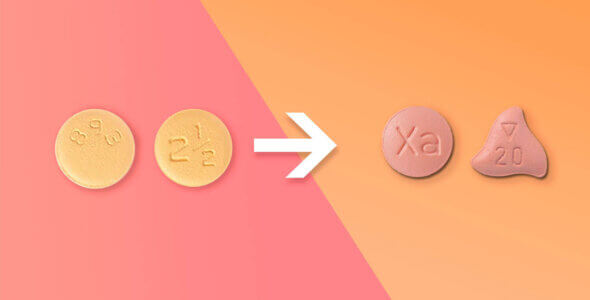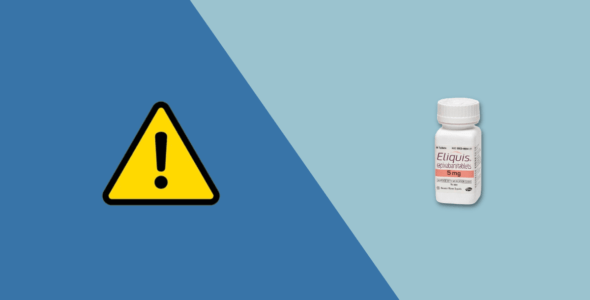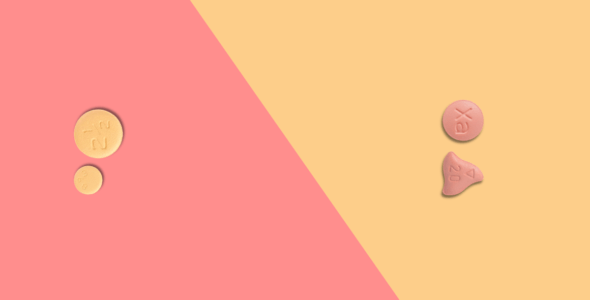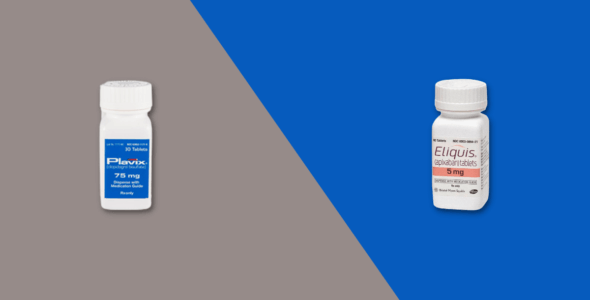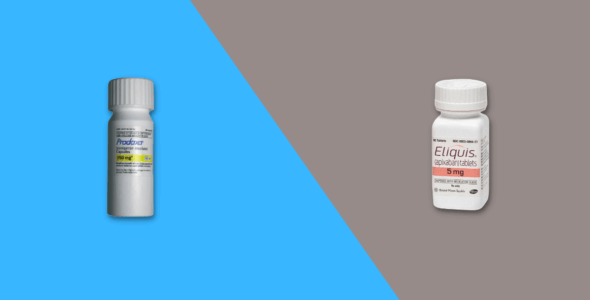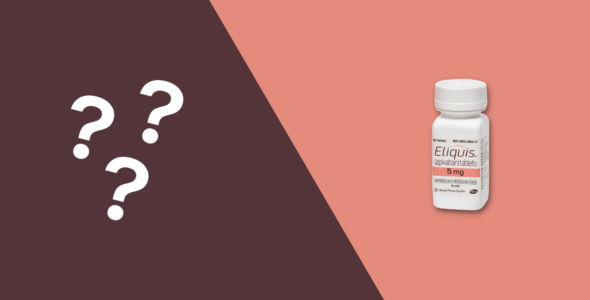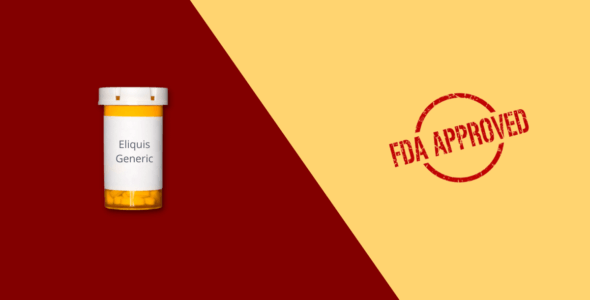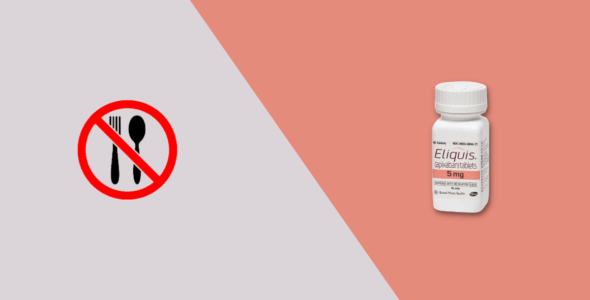Eliquis side effects and how to avoid them
Table of contents
Eliquis can cause adverse reactions. The more common side effects tend to be mild bleeding issues such as nosebleeds and you may also bruise more easily. Learn more about the most common Eliquis side effects and how to avoid them.
What is Eliquis?
Eliquis is an FDA-approved brand-name drug. It is an anticoagulant, a type of drug that stops blood clotting (from a liquid to a thick gel).
Eliquis is indicated for the following conditions:
- Reduce the risk of stroke and systemic embolism in patients with nonvalvular atrial fibrillation (AFib, or irregular heartbeat known as an arrhythmia)
- Prevent deep vein thrombosis (DVT) in the legs and pulmonary embolism (PE) in the lungs of patients who have had hip replacement or knee replacement surgery
- Treatment of deep vein thrombosis (DVT) in the legs
- Treatment of pulmonary embolism (PE) in the lungs
- Reduce the risk of recurrent DVT and PE
Eliquis (apixaban) is not recommended for patients with artificial heart valves.
Blood clotting is a normal process that happens when you’re injured. If you cut yourself, a clot forms to seal the cut to stop you from losing any more blood. But sometimes blood can clot inside your body where it shouldn’t, and this can cause problems. Clots can block the flow of blood, starve parts of the body of oxygen, and damage tissues. Depending on where blood clots form, they can cause deep vein thrombosis, heart attacks, or strokes. Sometimes Eliquis is called a blood thinner, as it helps to lower the chances of blood clots forming.
More information on what is Eliquis
How does Eliquis work?
The active ingredient in Eliquis is an anticoagulant called apixaban. As blood clots, it goes through a process of chemical reactions that turn it from a liquid into a thick gel. An enzyme called factor Xa is an important part of this process. The active ingredient apixaban attaches itself to factor Xa to stop it from working, reducing the likelihood of blood clots forming.
What doses of Eliquis are available?
Eliquis is available in the following doses: 2.5 mg tablets and 5 mg tablets.
The recommended dose of Eliquis is 5 mg orally twice daily. For patients 80 years of age or older, weighing 60 kg or less, or having serum creatinine equal to or above 1.5 mg/dL, the recommended dose is 2.5 mg orally twice daily. Eliquis starts working within 3 to 4 hours after you take your first dose. Always speak with a healthcare professional about any changes to your dose so they can monitor and evaluate your condition. There is a higher risk of blood clots or a stroke if Eliquis (apixaban) is stopped too soon. If you miss a dose, take it as soon as you remember. However, if it is near the time of the next dose, skip the missed dose.
Eliquis and bleeding
Your blood forms clots to plug cuts and injuries, stopping you from bleeding. Because Eliquis reduces blood clots, it can increase your risk of bleeding, which can be serious, or even fatal.
You should avoid taking other medications that increase your chances of bleeding with Eliqiuis. These include aspirin and other antiplatelet agents, other anticoagulants, heparin, selective serotonin reuptake inhibitors (SSRIs), antidepressants, serotonin-norepinephrine reuptake inhibitors (SNRIs), and nonsteroidal anti-inflammatory drugs (NSAIDs) like ibuprofen.
If you’re taking Eliquis and you begin to bleed or you experience symptoms of blood loss, seek urgent medical attention.
Get your Eliquis medication for only $49 per month
Get StartedSide effects of Eliquis
What are the most common side effects of Eliquis?
The most common side effects of Eliquis are related to bleeding, such as
- Nosebleeds
- Bleeding gums
- Heavier menstrual bleeding
- Unexpected vaginal bleeding
What are the bad side effects of Eliquis?
Serious side effects that can sometimes occur when taking Eliquis can include:
- Serious allergic reactions to the medication. Symptoms include hives, chest pain, and trouble breathing
- Bleeding in your brain and spinal column
- Bleeding in your lungs
- Bleeding into a muscle
- Unusual bleeding
- Vomiting blood that looks like coffee grounds
- Tarry stools
The increased risk of bleeding problems may on occasion turn into major bleeding, causing life-threatening results. Eliquis can have side effects, although not everyone will experience them, or have the same ones. Most side effects caused by Eliquis are related to increased bleeding, as the medication prevents clotting. Inform your doctor if you are on Eliquis before you have any medical or dental procedures or surgery.
This isn’t a comprehensive list of all the side effects Eliquis can cause. Side effects depend on the dose you’re taking and the condition you’re taking Eliquis for. You can find more details on the side effects in the patient leaflet that comes with your medication. If you have any concerns about Eliquis’ side effects, talk to your physician or a pharmacist for medical advice.
Stopping Eliquis side effects
Discontinuing treatment with Eliquis will normally stop the side effects you are experiencing. However, if you need to reverse the effects of Eliquis you may be prescribed an antidote such as Andexanet alfa (Andexxa) by your doctor. It is important to know that stopping Eliquis treatment may actually increase the risk of side effects. Speak to your doctor for medical advice if you plan to stop your Eliquis treatment.
Eliquis and drug interactions
Eliquis and other medications can interact with each other. These drug interactions can change how the drugs work and can make side effects more likely. Don’t take Eliquis if you’re taking any other medications to prevent blood clotting, like Coumadin (warfarin), Plavix (clopidogrel), Lovenox (enoxaparin), and Xarelto (rivaroxaban). Talk to your physician if you’re taking any of the following:
- An antifungal medicine e.g. itraconazole, ketoconazole
- Antiviral medicines for HIV/AIDS e.g. ritonavir
- Anti-inflammatory medicines e.g. naproxen
- Pain medications
- Medicines for high blood pressure or heart problems
- Antidepressants
- Medicines to prevent epilepsy or seizures e.g. carbamazepine, phenytoin
- Medicines to treat tuberculosis
- St John’s Wort
Before you take Eliquis tell your doctor if you:
- Have kidney or liver problems
- Have antiphospholipid syndrome 3
- Have any other medical conditions
- Have ever had bleeding problems
- Have had a spinal puncture
- Have had an epidural catheter, or if you are within 5 hours of its removal. It should not be taken by people receiving pain medications through an epidural catheter
- Are pregnant or plan to become pregnant or are breastfeeding
Make sure you tell your prescribing physician about all medications you’re taking, including any over-the-counter drugs or supplements.
How to take Eliquis
Eliquis comes as a tablet that is taken orally, usually swallowed with water. It’s typically taken once a day, at the same time each day. Eliquis can be taken with or without food.
If you have difficulty swallowing tablets, Eliquis can be crushed into a powder. This powder can be mixed into water, 5% dextrose in water, apple juice, or into apple puree. Talk to your doctor if you need to take Eliquis in this way.
Your Eliquis dosage will be decided upon by your physician. This will vary depending on the condition you’re taking it for and your medical history. Always take your Eliquis as directed by the prescribing medical professional.
If you take too much Eliquis you may have an increased risk of bleeding. You must seek medical attention immediately if this happens. Take your Eliquis packaging with you, even if there are no tablets left.
If you forget to take your Eliquis, take your normal dose as soon as you remember. Take your next dose at the usual time, then continue as normal.
Don’t stop taking Eliquis without talking to your physician. Your risk of developing a blood clot could be higher if you stop your treatment too early.
How to avoid Eliquis side effects
While completely avoiding Eliquis side effects may not be possible, there are some things you can do to reduce their severity:
1. Stick to the recommended dosage
Take your prescribed dose that has been recommended by your healthcare professional. It’s typically taken once a day, at the same time each day. Eliquis can be taken with or without food. Sticking to this timing and taking your medication consistently will make a big difference in how well Eliquis works for you.
If you miss a dose of this medicine, skip the missed dose and go back to your regular dosing schedule. Do not double doses. Refer to the medication guide for more drug information.
2. Store Eliquis correctly
Eliquis should be stored at room temperature in a dry place in its original container. Knowing how to properly store your medication is important to make sure it remains as effective as possible. Taking expired or improperly stored medication could result in the medication not working properly and may even cause unwanted side effects. It’s also important to leave the drying agent that comes in the bottle inside of the bottle to prevent excess moisture from affecting the medication. The bottle should be closed tightly.
3. Discuss medical history
Discussing your medical history with your healthcare provider is important to help them understand how well Elquis will work for you. Give a complete list of all the prescription drugs, including over-the-counter meds, supplements, and medical conditions you may have. Talking with your doctor will allow them to pick up any drug interactions with Eliquis that may increase possible side effects.
4. Pay attention to your body
Paying attention to how your body feels when taking Eliquis is important, taking particular attention to bleeding. Try to avoid sports or activities that may cause injury to you. Talk to your doctor straight away if you start to experience any side effects of Eliquis when taking it.
Medically reviewed
A medical professional has reviewed this article.


Jamie Winn, PharmD
Jamie Winn, PharmD
Dr. Jamie Winn received his Doctor of Pharmacy in 2002 from the University of South Carolina College of Pharmacy, Columbia, SC. Jamie is a medical reviewer for NiceRx.

